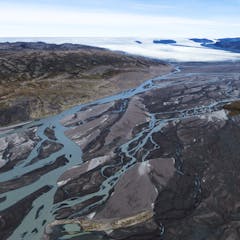
Articles on Ice loss
Displaying all articles

In winter 2023-24, the Great Lakes’ ice cover was near record lows, peaking at just 16%. Researchers explain how diminishing ice could have consequences for fisheries, and how species are evolving.

The soil was extracted during the Cold War from beneath one of the U.S military’s most unusual bases, then forgotten for decades.

Glaciologists are discovering new ways surface meltwater alters the internal structure of ice sheets, and raising an alarm that sea level rise could be much more abrupt than current models forecast.

Rocks deposited by vanishing glaciers in the Southern Alps thousands of years ago hold climate clues about the past, painting a bleak picture about the long-term survival of alpine ice in New Zealand.

This seemingly one-off heatwave may be a harbinger for the future under climate change.

Soot from research bases and sightseeing cruises is melting millions of tonnes of Antarctic snow every summer

Lakes in the northern hemisphere are rapidly losing their ice cover due to rising greenhouse gas emissions. The only way to preserve lake ice is to limit GHG emissions and slow down climate change.

Greenland’s melting ice sheets threaten to significantly hamper humanity’s efforts to mitigate climate change.

New research shows how fibre-optic cables can monitor the hidden structure of glaciers, teaching us about past and future ice flow.

Auckland’s extreme drought and the rapid retreat of glaciers in the Southern Alps both highlight how important long-term observations are for water management policy and planning.
